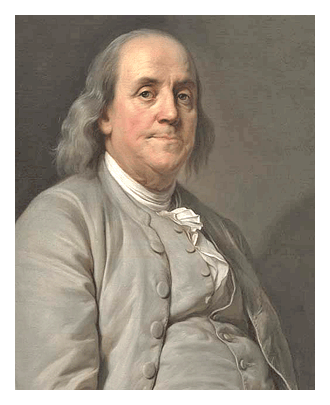
First of two parts
The more I read about Benjamin Franklin, the more outstanding he becomes.
How could one man have done so much?
I stood at his gravesite in Philadelphia and paused to wonder, once again, how extraordinary he was. No one today compares to his astounding and accomplished life. He was intelligent, a prodigious inventor, an articulate statesman, author, polymath, civic activist and postmaster (See History here). He was the U.S. minister to Sweden and later to France. He founded the Philadelphia Fire Department and the University of Pennsylvania.

His story began with his father, Josiah Franklin, who was a tallow chandler and soap-maker. Franklin’s father and all four of his grandparents were born in England. Josiah had 17 children with his two wives. He migrated to Boston in 1683.
Benjamin was born on Milk Street January 17, 1706 and baptized at Old South Meeting House. Josiah had only enough money to send him to school for two years. Benjamin attended Boston Latin School, but did not graduate. He learned through voracious reading.
His formal education ended when he was 10. At age 12 he became an apprentice to his brother, James, a printer, taught Benjamin the printing trade. His pseudonym of “Silence Dogood” was quoted as saying, “Without freedom of thought there can be no such thing as wisdom and no such thing as public liberty without freedom of speech.”
He ran away to Philadelphia when he was 17 for a new start in a new city. There he worked in several printing shops. At age 23 he was a successful newspaper editor and printer publishing the Pennsylvania Gazette. He became wealthy with that and with Poor Richard’s Almanack. The Almanack sold 10,000 copies a year. Recall “A penny saved is twopence dear,” or “Fish and visitors stink in three days.”
He pioneered and was first president of Academy and College of Philadelphia which opened in 1751 and later became the University of Pennsylvania. He was the first secretary of the American Philosophical Society and was president in 1769. He became a national hero when he led the effort for repeal of the unpopular Stamp Act. He was a major figure in the development of Franco-American relations and his efforts proved vital for the American Revolution in securing shipments of crucial munitions from France.
Franklin was promoted to deputy postmaster-general for the British colonies in 1753. During the Revolution, he became the first United States Postmaster General. He was active in community affairs and colonial and state politics as well as national and international affairs. He served as governor of Pennsylvania, 1785-1788. He owned and dealt in slaves, but by the 1750s, he argued against slavery from an economic perspective and became one of the most prominent abolitionists.
There lived this one man who left school at age 10 and yet invented the lightning rod, glass harmonies, the Franklin stove, bifocal glasses and the flexible urinary catheter. His work with electricity earned him the Royal Society’s Copley Medal in 1753 and in 1756 he became one of the few 18th Century Americans elected as a Fellow of the Society. He received honorary degrees from Harvard and Yale. Franklin played the violin, the harp, and the guitar. He composed string quartets in the early classical style. He was an avid chess player.
Some of his other ideas included the wave theory of light, meteorology wind findings, traction kiting, the concept of refrigeration and cooling, oceanography, electrical conductivity, and moral philosophy.
He had a common-law marriage with Deborah Read and they had two children. Those circumstances will be explained next week as I focus on Deborah Read Franklin.
This Founding Father who liked to swim and sail, this incomparable Benjamin Franklin, died from pleuritic attack at his home in Philadelphia April 17, 1790 at age 84 and three months. More than 20,000 attended his funeral.
Continued next week

